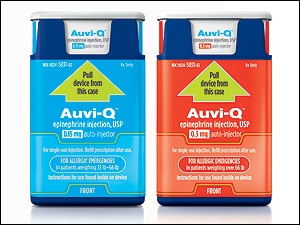August 13, 2012 — The first voice-guided epinephrine auto-injector (Auvi-Q, sanofi US) has been approved for use by the US Food and Drug Administration (FDA).
According to the manufacturer, this is the first auto-injector device with both audio and visual cues to guide patients through the injection process. The product will be commercially available sometime after November 15, Lori Lukus, director of product communications with sanofi US, told Medscape Medical News.
The auto-injector is indicated for the emergency treatment of life-threatening allergic reactions that may occur as a result of the ingestion of allergens, including nuts and eggs, and insect bites and stings.
 |
Auvi-Q
|
Auvi-Q is about the size of a credit card and the thickness of a cellular telephone. It has a retractable needle mechanism designed to help prevent accidental needle sticks after injection, the manufacturer states.
The device is available in 2 different doses: 0.3 mg epinephrine injection for patients who weigh 66 pounds or more and 0.15 mg epinephrine injection for patients who weigh between 33 and 66 pounds. The device has not been studied in patients weighing less than 33 pounds.
In a telephone interview with Medscape Medical News, independent commentator Clifford Bassett, MD, said that this new device is "very exciting" because any time a device can be made "easier, simpler and more pleasant, and even cooler, then we will increase the likelihood that patients will keep it available during an emergency."
According to the manufacturer, approximately two thirds of patients and caregivers do not always carry their epinephrine auto-injector as recommended, and nearly half worry that others will not know how to use their device during an emergency.
"The audio feature of this device is certainly unique," Dr. Bassett added. "We are really looking forward to such a device in the allergy community. My hope is that the device will penetrate into the market of those individuals who do not currently carry an auto-injector with them."
Dr. Bassett is a spokesperson for the American College of Allergy, Asthma and Immunology and allergist with Allergy & Asthma Care of New York.
Sanofi US licensed the North American commercialization rights to Auvi-Q from Intelliject Inc, which has retained commercialization rights for the rest of the world.
Dr. Bassett has disclosed no relevant financial relationships.
Comments
Post a Comment